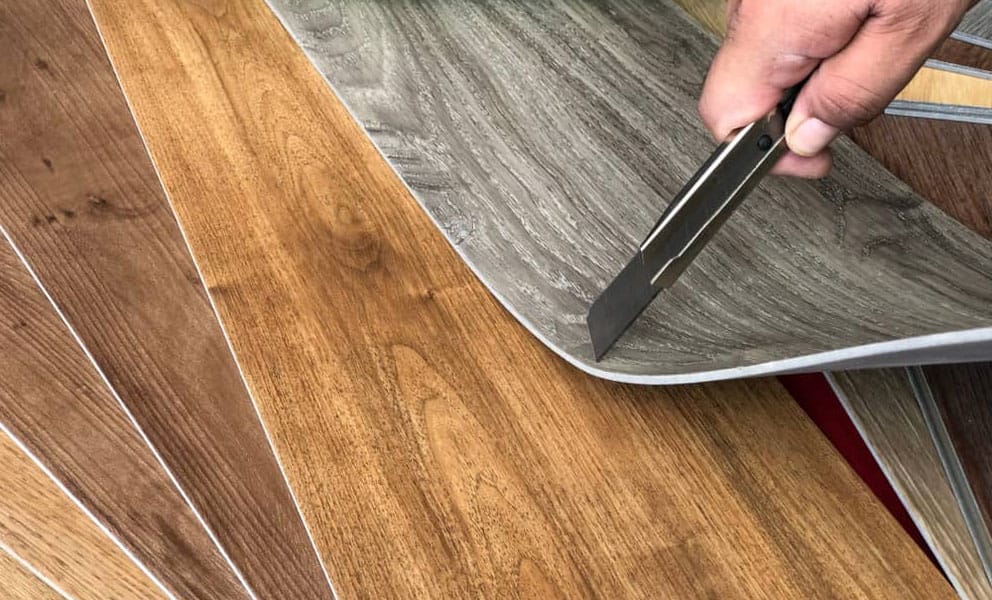Menu

But with both materials offering a range of benefits, which option do you pick? To help make life a little easier, below we cover the main differences between vinyl and laminate flooring so that you can make the best choice.
Vinyl flooring is a synthetic material typically coated in PVC vinyl. It comes in sheets, planks or tiles and features a thicker multi-layer core for durability.
Laminate flooring often mimics the look of wood flooring. It is a similar design to vinyl. However, the core is made with wood by-products and is held together with resin.
Now we’ve covered what these materials are - it’s now time to look at the finer details.
Vinyl products come in a variety of looks and styles. Like laminate, it can mimic wood flooring and thicker planks offer more embossing to look realistic. There are also other designs with a stone or tile appearance.
Laminate flooring is often thicker, so 3D embossing is achievable for a wood-like look. While faux wood designs are popular, you can also get ceramic and stone aesthetics.
The composition of vinyl flooring ensures it is durable and easy to maintain. However, opting for click and lock planks instead of stick-on tiles will avoid loosening over time. Vinyl flooring is a great long-term option too, with products lasting up to 20 years.
Similarly, laminate flooring is also long-lasting and hardwearing. However, if used in a high-moisture area, it may degrade faster. Both materials are easy to clean and maintain. But if you scratch laminate, it is challenging to repair. But with good care and maintenance, laminate may last between 10 and 20 years.
If you’re looking for flooring that is simple to clean and care for, vinyl is a great choice. It can be mopped and scrubbed without the worry of damaging the appearance.
In contrast, you need to clean laminate flooring with specialist products and minimal moisture. Any water that penetrates the joins of the surface may cause it to warp and crack.
The beauty of vinyl products is that they’re 100% waterproof. This means its ideal for bathrooms, kitchens and hallways. Good quality vinyl flooring is typically unaffected by excess water, such as leaks. This material is also a perfect pairing for underfloor heating.
While vinyl is resistant to water, laminate flooring doesn’t quite have the same benefits. Its wood core is susceptible to swelling if it comes into contact with water for prolonged periods. Plus, once it has warped, it will need to be replaced.
If installed well, water should not get into the seams. However, any spillages would need to be cleaned quickly. For this reason, it is not recommended for moisture-prone areas, particularly the bathroom, and especially if the kids love splashing in the bath.
Both materials are easier to install than natural options such as hardwood or stone. In addition, most laminate and vinyl flooring planks use a tongue and groove system, ensuring a clean fit.
However, the main area to consider with installation is cutting and whether you want to install it yourself. Vinyl is easier to cut, and a utility knife will do the job. But, laminate flooring will require extra tools such as a table or circular saw.
If you choose vinyl products, it’s also best to opt for planks or tiles instead of sheet vinyl. Large sheets are heavier to install and require exact measurements to fit the space. If you choose this method, opt for a professional to take the hard work out of it.
Each material is warmer underfoot compared to natural materials. While laminate is quieter than hardwood, there is still some sound, especially if walking on it with shoes. In comparison, vinyl is often softer, especially when installed with a thick underlay.
Vinyl and laminate are designed to offer excellent stain resistance if you happen to drop liquids or food on them. This is because the material has a protective layer that stops stains from penetrating the surface. Plus, both are easy to clean straight off.
However, to keep the barrier intact on laminate, be careful what cleaning products you use. Harsh chemicals are likely to strip it, which will degrade its stain resistance.
Depending on what room you’re looking to buy for, could determine what material is best for the job. Fortunately, vinyl is ideal for any room in the house due to its water resistance and other features. Laminate is also suitable for most rooms. However, it’s not advisable to use it in bathrooms or high-moisture areas.
Regarding costs, vinyl and laminate are relatively comparable in price depending on the quality and thickness you purchase. The main plus for each option is that they’re very affordable compared to other materials such as hardwood, stone and tiling.
The differences between vinyl and laminate offer some insight into what material is best for your home. There are some areas where vinyl pips laminate to the post, especially in terms of water resistance.
At Igloo Surfaces, our Simplex range of vinyl flooring has a 10-year guarantee to back up its quality. With a wide range of designs and colours, it’s an ideal solution for many rooms in the house.
While this guide may help uncover some of the main differences between the two materials, we also understand that you might also have additional questions. So don't hesitate to get in touch with the team if we can offer any further advice or help with your next flooring purchase.